The Expandable Microspheres Market is estimated to be valued at USD 5.2 billion in 2025 and is projected to reach USD 15.2 billion by 2035, registering a compound annual growth rate (CAGR) of 11.4% over the forecast period. This early-phase growth is driven by increasing demand in lightweight materials for construction, automotive, and packaging applications. The market will benefit from technological advancements in microsphere production, growing applications in insulation materials, and rising consumer demand for energy-efficient solutions across industries. The second half (2030–2035) will contribute USD 3.8 billion, representing 51.3% of the total growth, reflecting stronger momentum as demand for expandable microspheres increases in specialized sectors like aerospace, oil & gas, and medical devices. Annual increments average USD 0.8 billion per year in the first phase, while later years are expected to see stronger growth driven by the adoption of these materials in emerging technologies and applications. Manufacturers focusing on product innovation and expanding their application areas will capture the largest share of this USD 7.5 billion opportunity.
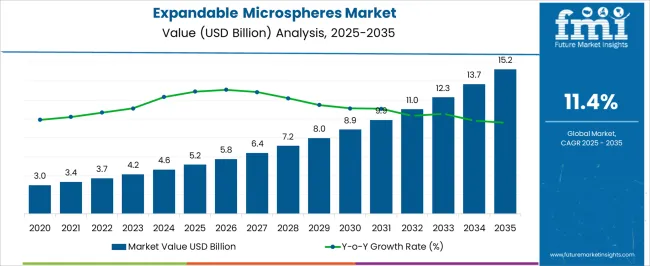
| Metric | Value |
|---|---|
| Expandable Microspheres Market Estimated Value in (2025 E) | USD 5.2 billion |
| Expandable Microspheres Market Forecast Value in (2035 F) | USD 15.2 billion |
| Forecast CAGR (2025 to 2035) | 11.4% |
The Expandable Microspheres Market is experiencing steady growth, driven by increasing demand for lightweight, high-performance materials across a range of industries. Current market dynamics reflect growing adoption of microspheres in coatings, plastics, and construction applications where thermal insulation, density reduction, and surface enhancement are critical.
According to recent industry-focused news and corporate briefings, manufacturers are shifting toward advanced formulation technologies to improve efficiency and product performance, further expanding their use cases. Market activity is also supported by the push for sustainability and energy efficiency, particularly in sectors like automotive and packaging, where material weight reduction contributes to regulatory compliance and cost savings.
Additionally, the ability of expandable microspheres to deliver consistent performance under varying temperature and pressure conditions is being recognized across R&D and industrial applications With continued investment in product innovation, rising awareness of environmental regulations, and the growing need for high-performance additives, the market is expected to maintain a positive outlook over the coming years.
The expandable microspheres market is segmented by type, polymer type, end-use industry, and geographic regions. The expandable microspheres market is categorized by type into Dry and Wet. The expandable microspheres market is classified by polymer type into Polyacrylic Ester (PAE), Polyvinyl Acetate (PVA), and Vinyl Acetate Ethylene (VAE). The end-use industry of the expandable microspheres market is segmented into Automotive, Construction, Consumer goods, Sports and leisure, and Others (packaging industry, textile industry). Regionally, the expandable microspheres industry is classified into North America, Latin America, Western Europe, Eastern Europe, Balkan & Baltic Countries, Russia & Belarus, Central Asia, East Asia, South Asia & Pacific, and the Middle East & Africa.
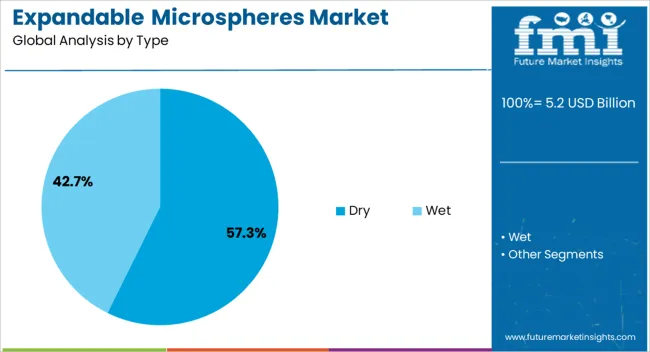
The dry type segment is projected to account for 57.3% of the Expandable Microspheres Market revenue share in 2025, securing its position as the leading product category. This dominance has been supported by its superior storage stability, ease of handling, and efficient incorporation into various end-use formulations. As detailed in technical bulletins and product innovation updates, dry microspheres are being increasingly used in thermoplastics, automotive parts, and construction materials due to their controlled expansion behavior and compatibility with different resin systems.
These materials have gained traction in industries aiming to reduce product weight without compromising structural integrity. Their dry nature minimizes transportation and storage costs, which has been a significant consideration for manufacturers operating at scale.
In addition, their reactivity under controlled heat conditions allows precise expansion during processing, improving overall quality and yield These combined factors have led to increased adoption, contributing to the segment’s leadership position within the market.
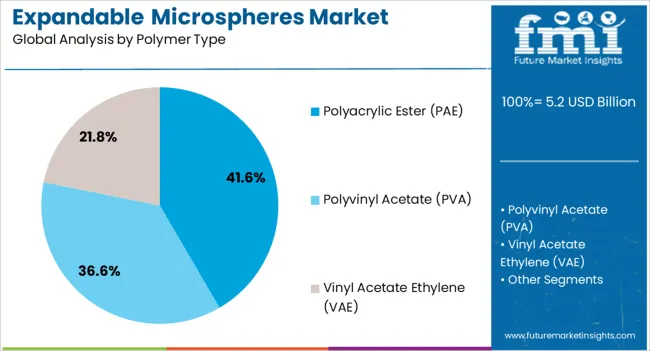
The polyacrylic ester (PAE) polymer type segment is anticipated to contribute 41.6% of the Expandable Microspheres Market revenue share in 2025, establishing it as the dominant polymer category. This growth is being driven by its excellent flexibility, durability, and chemical resistance, which are highly desirable in industrial coatings, sealants, and adhesives.
According to press statements and product application insights shared by chemical manufacturers, PAE-based microspheres offer superior bonding strength and weatherability, making them suitable for exterior applications and high-performance materials. The increasing preference for water-based and low-VOC formulations has further elevated demand for PAE microspheres, which align with environmental safety standards and regulatory frameworks.
The segment's strength is also tied to the polymer's compatibility with multiple substrates, enabling seamless integration in both automotive and construction sectors As manufacturers prioritize performance, compliance, and sustainability, PAE-based microspheres have emerged as a preferred solution, contributing significantly to market share.
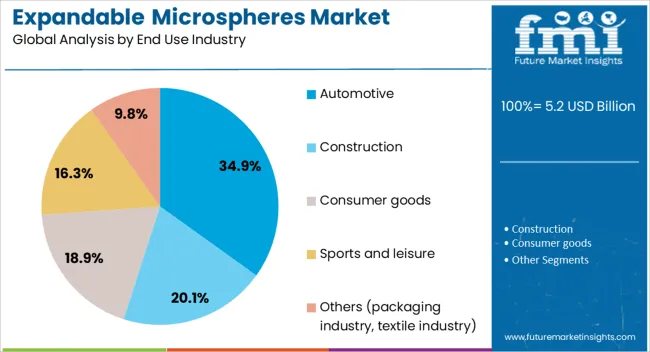
The automotive segment is expected to account for 34.9% of the Expandable Microspheres Market revenue share in 2025, making it the leading end-use industry. Growth in this segment has been largely influenced by the industry's focus on vehicle weight reduction, fuel efficiency, and emission control. As noted in automotive supplier updates and OEM strategy reports, expandable microspheres are increasingly used in interior and exterior components, lightweight panels, and soundproofing materials.
Their ability to reduce overall part density without affecting strength or durability aligns with the industry's engineering and sustainability objectives. In addition, the integration of microspheres into automotive coatings and sealants is improving energy absorption and thermal insulation, which enhances vehicle performance and passenger comfort.
Supply chain partners have recognized the operational and environmental benefits of microsphere-enhanced composites, which support both regulatory compliance and cost optimization These factors have positioned the automotive sector as a major consumer of expandable microspheres, driving its continued leadership in the market.
The expandable microspheres market is driven by the rising demand for lightweight, high-performance materials, particularly in the automotive and construction sectors. Opportunities are expanding with growing demand for energy-efficient products, while trends toward eco-friendly and bio-based microspheres are reshaping the market. However, high production costs and raw material availability remain significant barriers. By 2025, overcoming these challenges through cost-efficient production methods and alternative sourcing will be crucial for sustaining market growth.
The expandable microspheres market is growing due to the increasing demand for lightweight and high-performance materials in industries such as automotive, construction, and packaging. These microspheres are used to reduce weight and improve insulation in products like coatings, foams, and concrete. As industries look for cost-effective ways to enhance product performance and reduce energy consumption, expandable microspheres are becoming essential. By 2025, the demand for these materials will continue to rise, driven by the focus on efficient, high-quality manufacturing.
Opportunities in the expandable microspheres market are growing within the automotive and construction sectors. In automotive applications, these microspheres are used to enhance fuel efficiency by reducing vehicle weight. Similarly, in construction, microspheres improve thermal insulation and fire resistance in building materials. By 2025, continued growth in these sectors, combined with the need for improved energy-efficient products, will drive the demand for expandable microspheres, offering lucrative opportunities for manufacturers in these industries.
Emerging trends in the expandable microspheres market include the growing adoption of bio-based and eco-friendly microspheres. As industries strive to reduce their environmental footprint, the demand for sustainable alternatives to traditional microspheres is increasing. Bio-based microspheres, made from renewable resources, offer a greener solution for a variety of applications. By 2025, the focus on sustainable products will likely shape the market, with eco-friendly microspheres becoming increasingly important in industries seeking to align with environmental goals.
Despite market growth, challenges related to high production costs and limited availability of raw materials remain in the expandable microspheres market. The cost of producing high-quality microspheres, particularly those with specialized properties, can be expensive. Additionally, sourcing the raw materials required for production can be challenging, which may lead to supply chain disruptions. By 2025, addressing these challenges through more efficient manufacturing processes and alternative sourcing strategies will be essential for ensuring continued market growth.
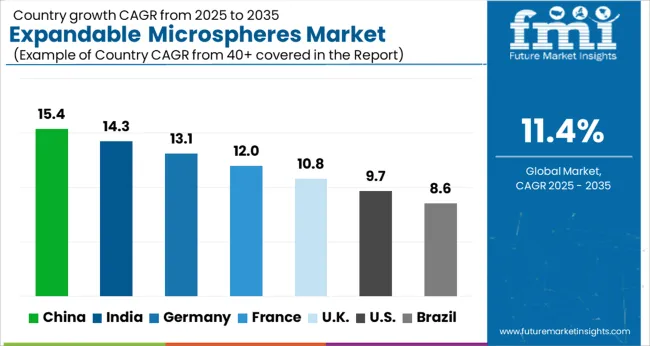
The global expandable microspheres market is projected to grow at an 11.4% CAGR from 2025 to 2035. China leads with a growth rate of 15.4%, followed by India at 14.3%, and France at 12%. The United Kingdom records a growth rate of 10.8%, while the United States shows the slowest growth at 9.7%. These varying growth rates are driven by factors such as increasing demand for lightweight, energy-efficient materials in the construction, automotive, and packaging industries, as well as advancements in nanotechnology and sustainable production methods. Emerging markets like China and India are witnessing higher growth due to rapid industrialization, infrastructure development, and increasing demand for high-performance materials, while more mature markets like the USA and the UK experience steady growth driven by regulatory standards, innovation, and the shift toward sustainable manufacturing solutions. This report includes insights on 40+ countries; the top markets are shown here for reference.
The expandable microspheres market in China is growing at a robust pace, with a projected CAGR of 15.4%. China’s rapid industrialization and growing demand for lightweight, energy-efficient materials in industries such as construction, automotive, and packaging are driving the adoption of expandable microspheres. The country’s increasing focus on sustainability, along with government initiatives promoting energy-efficient building materials and eco-friendly products, is further boosting market growth. Additionally, China’s strong manufacturing base and investments in research and development for advanced materials are accelerating the demand for expandable microspheres across various industrial applications.
The expandable microspheres market in India is projected to grow at a CAGR of 14.3%. India’s rapidly expanding construction and automotive industries, along with increasing demand for lightweight and high-performance materials, are driving the adoption of expandable microspheres. The country’s growing emphasis on sustainability, energy efficiency, and reducing carbon footprints in manufacturing is further contributing to the market’s growth. Additionally, India’s focus on infrastructure development and the need for eco-friendly and cost-effective solutions in industrial applications are accelerating the demand for expandable microspheres across various sectors.
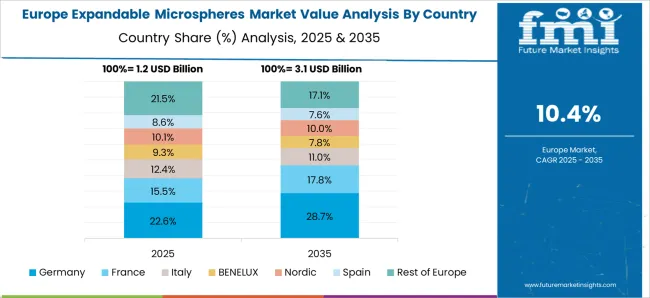
The expandable microspheres market in France is projected to grow at a CAGR of 12%. France’s strong focus on sustainability, combined with the increasing demand for energy-efficient materials in construction, automotive, and packaging sectors, is driving steady market growth. The country’s regulatory standards promoting the use of eco-friendly and lightweight materials are further boosting the demand for expandable microspheres. Additionally, France’s emphasis on advanced manufacturing processes and research and development in high-performance materials is accelerating the adoption of these microspheres in various industrial applications.
The expandable microspheres market in the United Kingdom is projected to grow at a CAGR of 10.8%. The UK’s increasing demand for lightweight, energy-efficient materials in construction, automotive, and packaging industries continues to drive steady growth in the market. The country’s focus on reducing environmental impact and adopting sustainable materials in industrial production is contributing to the adoption of expandable microspheres. Additionally, the UK’s strong emphasis on technological innovation and advanced manufacturing techniques supports the continued growth of the market as industries seek to improve product performance and reduce energy consumption.
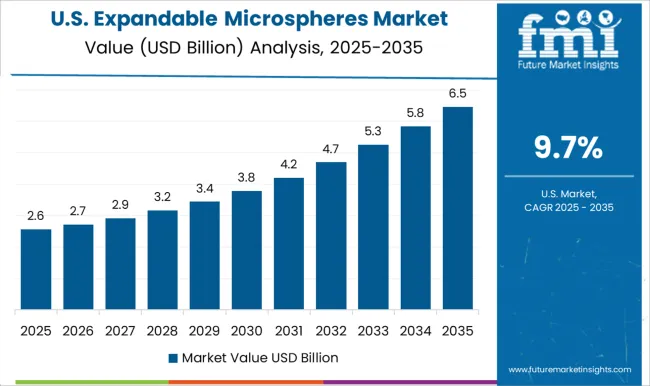
The expandable microspheres market in the United States is expected to grow at a CAGR of 9.7%. The USA market is driven by demand from industries such as automotive, construction, and packaging, which are increasingly adopting lightweight and high-performance materials to improve energy efficiency and product durability. The country’s focus on sustainability and reducing carbon footprints in manufacturing processes is contributing to the growing use of expandable microspheres. Additionally, technological advancements and innovations in the production of microspheres are driving market adoption, despite slower growth compared to emerging markets.
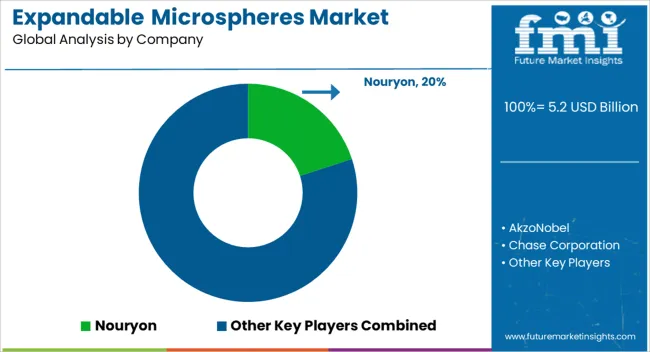
The expandable microspheres market is dominated by Nouryon, which leads with its advanced microsphere products used in a wide range of industries, including automotive, construction, and packaging. Nouryon’s dominance is supported by its innovative technology, extensive product portfolio, and global presence in the expandable microspheres market. Key players such as AkzoNobel, Chase Corporation, and Kureha Corporation maintain significant market shares by offering high-performance microspheres that enhance product quality, reduce material weight, and improve thermal insulation. These companies focus on providing cost-effective, eco-friendly solutions for various applications, including lightweight composite materials, paints, and coatings. Emerging players like Crerax, Dennert Poraver GmbH, and Matsumoto Yushi-Seiyaku Co., Ltd. are expanding their market presence by offering specialized expandable microspheres for niche markets, including high-performance plastics, medical devices, and industrial coatings. Their strategies include enhancing material properties such as expansion ratio, improving production efficiency, and focusing on sustainability. Market growth is driven by increasing demand for lightweight materials, rising interest in energy-efficient construction, and the growth of the automotive and aerospace industries. Innovations in microsphere production, such as higher expansion capabilities and more versatile applications, are expected to continue shaping competitive dynamics and drive growth in the global expandable microspheres market.
| Item | Value |
|---|---|
| Quantitative Units | USD 5.2 Billion |
| Type | Dry and Wet |
| Polymer Type | Polyacrylic Ester (PAE), Polyvinyl Acetate (PVA), and Vinyl Acetate Ethylene (VAE) |
| End Use Industry | Automotive, Construction, Consumer goods, Sports and leisure, and Others (packaging industry, textile industry) |
| Regions Covered | North America, Europe, Asia-Pacific, Latin America, Middle East & Africa |
| Country Covered | United States, Canada, Germany, France, United Kingdom, China, Japan, India, Brazil, South Africa |
| Key Companies Profiled | Nouryon, AkzoNobel, Chase Corporation, Chinasinno, Crerax, Dennert Poraver GmbH, Kumyang, Kureha Corporation, Mark Impex, Matsumoto Yushi-Seiyaku Co., Ltd, Nanjing Chemical Material Corp., and Sekisui Chemical Co., Ltd. |
| Additional Attributes | Dollar sales by microsphere type and application, demand dynamics across automotive, construction, and packaging sectors, regional trends in expandable microsphere adoption, innovation in lightweight and high-strength materials, impact of regulatory standards on safety and performance, and emerging use cases in energy-efficient insulation and advanced composite materials. |
The global expandable microspheres market is estimated to be valued at USD 5.2 billion in 2025.
The market size for the expandable microspheres market is projected to reach USD 15.2 billion by 2035.
The expandable microspheres market is expected to grow at a 11.4% CAGR between 2025 and 2035.
The key product types in expandable microspheres market are dry and wet.
In terms of polymer type, polyacrylic ester (pae) segment to command 41.6% share in the expandable microspheres market in 2025.






Full Research Suite comprises of:
Market outlook & trends analysis
Interviews & case studies
Strategic recommendations
Vendor profiles & capabilities analysis
5-year forecasts
8 regions and 60+ country-level data splits
Market segment data splits
12 months of continuous data updates
DELIVERED AS:
PDF EXCEL ONLINE
Expandable Polystyrene Market Size and Share Forecast Outlook 2025 to 2035
Thermoexpandable Polymer Microsphere Market Size and Share Forecast Outlook 2025 to 2035
Microsphere Market Analysis by Type, Applications and Region: Forecast from 2025 to 2035

Thank you!
You will receive an email from our Business Development Manager. Please be sure to check your SPAM/JUNK folder too.
Chat With
MaRIA